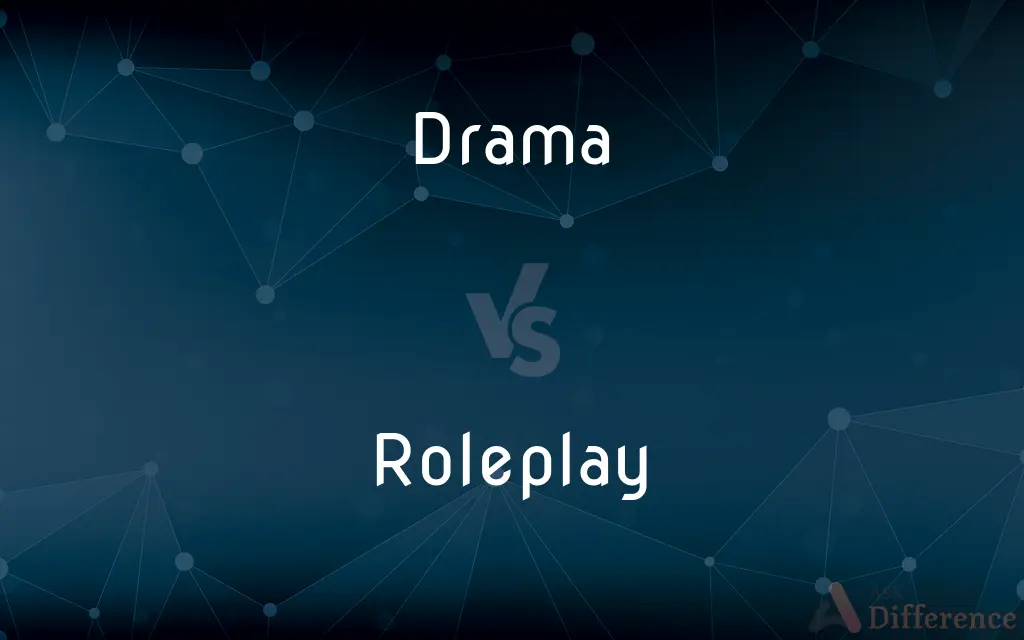Drama vs. Roleplay — What's the Difference?
By Tayyaba Rehman — Updated on November 1, 2023
Drama is a genre of narrative fiction (or semi-fiction) intended for the theater, while roleplay involves assuming a role for the purpose of a game, training, or personal development.

Difference Between Drama and Roleplay
Table of Contents
ADVERTISEMENT
Key Differences
Drama, in its most traditional sense, refers to a form of theater where actors perform a story before an audience. It is a structured form of storytelling that often explores complex human emotions and conflicts. Roleplay, by contrast, is a more informal and interactive form of storytelling where individuals assume characters and act out roles in a narrative, often without an audience. Drama is intended for an audience's entertainment, showcasing actors interpreting a writer’s script, whereas roleplay is participatory and often used for educational purposes or personal enjoyment among the players themselves.
In terms of origin and use, drama stems from ancient theatrical traditions and is now a broad term encompassing television, film, and stage performances. Roleplay, however, originates from training exercises and games. It has evolved to include a wide range of activities, from therapy sessions to immersive gaming experiences. While drama focuses on plot and character development for the sake of storytelling, roleplay centers on personal interaction and decision-making within a set character's persona.
Moreover, drama often requires a more formal setting, with a stage, costumes, and props to enhance the storytelling. Roleplay may require little to no props and can take place in any setting. In drama, actors rehearse and perform a predetermined script, while in roleplay, the participants may improvise their actions and dialogue within the bounds of their characters’ objectives and the narrative context.
Lastly, drama traditionally has a clear division between the performer and the audience, with the former presenting a crafted expression of the art form. Roleplay blurs these lines, as the participants are both the performers and the audience of their interactive narrative. Drama's success is often measured by critical acclaim and audience reception, whereas roleplay's success is more subjective, based on personal fulfillment and the enjoyment of the players.
Comparison Chart
Purpose
To entertain and present a narrative.
To engage in character and scenario enactment.
ADVERTISEMENT
Audience
Separation from performers.
Participants often create and witness.
Structure
Scripted with rehearsals.
Often improvised without a script.
Performance Environment
Formal setting like theater.
Any setting, formal or informal.
Origin
Ancient theatrical traditions.
Training exercises and games.
Compare with Definitions
Drama
The art of composing, directing, and acting dramas.
She studied drama at the university.
Roleplay
Practicing behaviors in simulated scenarios.
Roleplay is a key part of the customer service training program.
Drama
An exciting, emotional, or unexpected event or circumstance.
The sudden resignation caused a lot of drama in the office.
Roleplay
To experiment with different social scenarios.
Roleplay helps children learn about social norms.
Drama
A category of narrative fiction.
He prefers films in the drama genre.
Roleplay
Acting out a role for training or entertainment.
The students engaged in roleplay to understand historical figures.
Drama
Such a work for television, radio or the cinema (usually one that is not a comedy)
Roleplay
Assuming characters in a game.
They spent the evening roleplaying as elves and wizards.
Drama
Drama is the specific mode of fiction represented in performance: a play, opera, mime, ballet, etc., performed in a theatre, or on radio or television. Considered as a genre of poetry in general, the dramatic mode has been contrasted with the epic and the lyrical modes ever since Aristotle's Poetics (c.
Roleplay
(intransitive) To act out a scenario or fantasy with another person or other people.
To spice up their sex life, they like to roleplay.
Drama
A play for theatre, radio, or television
A gritty urban drama about growing up in Harlem
Roleplay
(transitive) To act as a character as part of a fantasy, especially with a group.
He likes to roleplay a vampire.
Drama
An exciting, emotional, or unexpected event or circumstance
A hostage drama
An afternoon of high drama at Wembley
Roleplay
The act or practice of roleplaying; an instance of roleplaying.
Drama
A prose or verse composition, especially one telling a serious story, that is intended for representation by actors impersonating the characters and performing the dialogue and action.
Roleplay
The practice of roleplaying.
Drama
A serious narrative work or program for television, radio, or the cinema.
Roleplay
Perform on a stage or theater;
She acts in this play
He acted in `Julius Caesar'
I played in `A Christmas Carol'
Drama
Theatrical plays of a particular kind or period
Elizabethan drama.
Roleplay
To enact certain situations for therapeutic purposes.
The therapist used roleplay to help him confront his fears.
Drama
The art or practice of writing or producing dramatic works.
Drama
A situation or succession of events in real life having the dramatic progression or emotional effect characteristic of a play
The drama of the prisoner's escape and recapture.
Drama
The quality or condition of being dramatic
A summit meeting full of drama.
Drama
A composition, normally in prose, telling a story and intended to be represented by actors impersonating the characters and speaking the dialogue
The author released her latest drama, which became a best-seller.
Drama
Theatrical plays in general
Drama
A situation in real life that has the characteristics of such a theatrical play
After losing my job, having a car crash, and the big row with my neighbours, I don't need any more drama.
Drama
(slang) Rumor, lying or exaggerated reaction to life or online events; melodrama; an angry dispute or scene; a situation made more complicated or worse than it should be; intrigue or spiteful interpersonal maneuvering.
Drama
A composition, in prose or poetry, accommodated to action, and intended to exhibit a picture of human life, or to depict a series of grave or humorous actions of more than ordinary interest, tending toward some striking result. It is commonly designed to be spoken and represented by actors on the stage.
A divine pastoral drama in the Song of Solomon.
Drama
A series of real events invested with a dramatic unity and interest.
Westward the course of empire takes its way;The four first acts already past,A fifth shall close the drama with the day;Time's noblest offspring is the last.
The drama and contrivances of God's providence.
Drama
Dramatic composition and the literature pertaining to or illustrating it; dramatic literature.
Drama
A dramatic work intended for performance by actors on a stage;
He wrote several plays but only one was produced on Broadway
Drama
An episode that is turbulent or highly emotional
Drama
The literary genre of works intended for the theater
Drama
The quality of being arresting or highly emotional
Drama
A play for theater, radio, or TV.
She attended the premiere of the new drama at the local theater.
Drama
Intense conflict of emotions.
Their argument reached a high level of drama.
Common Curiosities
Do all dramas have to be serious?
No, dramas can range from serious to comedic.
Can roleplay be considered a type of drama?
Yes, in the broader sense of performing roles.
Is drama only performed on stage?
No, drama includes works on stage, TV, and film.
Is roleplay used in professional training?
Yes, it's often used in various training contexts.
Is roleplay beneficial for children?
Yes, it can aid in social and emotional development.
Are actors in a drama called roleplayers?
No, they are usually referred to as actors or performers.
Are scripts necessary for drama?
Typically yes, though some forms can be improvised.
Can roleplay involve competition?
Yes, especially in roleplaying games.
Does roleplay always involve costumes?
Not always, it depends on the context and preference.
Can watching drama be educational?
Yes, many dramas are informative and thought-provoking.
Is the audience participation common in drama?
Not usually, as drama typically has a clear audience-performer divide.
Is improvisation a part of roleplay?
It often is, though some roleplay can be more structured.
Can drama be a single-person performance?
Yes, one-person shows are a form of drama.
Do dramas always tell a fictional story?
No, they can be fictional or based on true events.
Does roleplay require a director?
No, roleplay is usually self-directed by the participants.
Share Your Discovery

Previous Comparison
Cradle vs. Hug
Next Comparison
Issuance vs. IssueAuthor Spotlight
Written by
Tayyaba RehmanTayyaba Rehman is a distinguished writer, currently serving as a primary contributor to askdifference.com. As a researcher in semantics and etymology, Tayyaba's passion for the complexity of languages and their distinctions has found a perfect home on the platform. Tayyaba delves into the intricacies of language, distinguishing between commonly confused words and phrases, thereby providing clarity for readers worldwide.














































